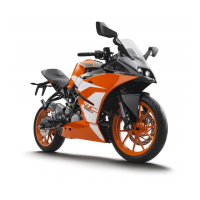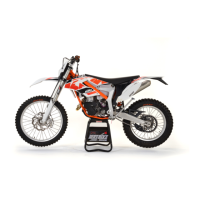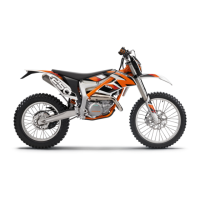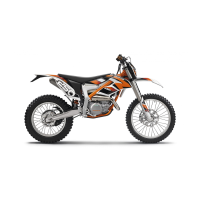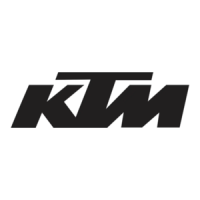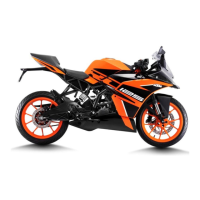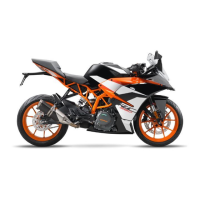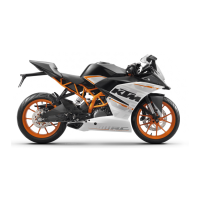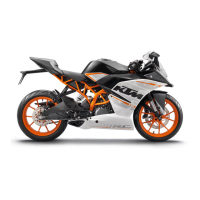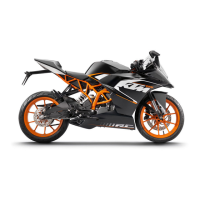Do you have a question about the KTM RC 250 R and is the answer not in the manual?
Welcoming message from KTM to the new owner, encouraging enjoyment.
Explains the meaning of symbols used throughout the manual for clarity and safety.
Describes the typographical formats used in the manual for consistent presentation.
Defines the intended use of the KTM sport motorcycle and its limitations.
Provides essential safety instructions for operating the vehicle safely.
Explains the danger levels and associated symbols used to highlight risks.
Outlines safe operating practices and precautions for the rider's safety.
Emphasizes the importance of wearing appropriate protective clothing for riding.
Details rules and guidelines for performing maintenance and repair work safely.
Advises on responsible use and disposal concerning the environment.
Guides on how to use and maintain the Owner's Manual for reference.
Specifies approved operating and auxiliary substances for the motorcycle.
Recommends using only KTM-approved spare parts and accessories for safety.
Highlights the importance of proper service for optimal performance and longevity.
Notes that figures may show special equipment and might be simplified.
Directs users to authorized KTM dealers for assistance and information.
Illustrates and labels components from the front left side of the vehicle.
Illustrates and labels components from the rear right side of the vehicle.
Details the location of the vehicle's unique identification number on the frame.
Specifies where the engine number is stamped on the right side of the engine.
Indicates the location of the fork part number on the upper side of the fork.
Identifies the location of the shock absorber part number on the preload adjuster ring.
Shows where the steering damper part number is stamped on the top.
Describes the function and location of the clutch lever on the left handlebar.
Explains the hand brake lever and its connection to the front brake on the right handlebar.
Details the throttle grip placement and its smooth operation on the right handlebar.
Explains the ignition switch positions and their effects on the vehicle's circuits.
Describes the tail light switch and its on/off states on the left handlebar.
Explains how to use the Map-Select switch to change engine characteristics.
Describes the activation and function of the Launch-Control button on the left handlebar.
Details the activation and function of the Pit-Limiter button on the left handlebar.
Explains the quick shifter switch and its deactivation for riding.
Describes the meaning of various indicator lamps on the dashboard.
Continues the explanation of indicator lamps and warning lights.
Provides a detailed overview of the combination instrument's features and settings.
Guides on adjusting various settings within the combination instrument.
Instructions on how to open the fuel filler cap safely.
Instructions on how to securely close the fuel filler cap.
Details how to adjust the engine's idle speed using the adjusting screw.
Explains the shift lever and gear position indication.
Describes the foot brake lever and its function for the rear brake.
Provides crucial advice for the initial operation of the motorcycle.
Outlines the recommended procedure for breaking in the engine.
Lists essential checks and maintenance before each ride for safety.
Step-by-step guide for starting the motorcycle's engine safely.
Provides instructions and precautions for transporting the motorcycle.
Details the correct and safe procedure for refueling the motorcycle.
Outlines maintenance tasks at 13,500 rpm intervals.
Lists optional maintenance tasks for 13,500 rpm intervals.
Outlines maintenance tasks at 14,000 rpm intervals.
Lists optional maintenance tasks for 14,000 rpm intervals.
Explains how to adjust the fork's compression damping settings.
Guides on adjusting the fork's rebound damping settings.
Details how to adjust the spring preload on the front forks.
Explains the influence and adjustment of the fork offset.
Step-by-step instructions for modifying the fork offset.
Describes the compression damping division for the shock absorber.
Guides on adjusting the low-speed compression damping of the shock absorber.
Details how to adjust the high-speed compression damping of the shock absorber.
Explains how to adjust the rebound damping of the shock absorber.
Guides on adjusting the spring preload for the shock absorber.
Explains the purpose and adjustment of the steering damper.
Step-by-step instructions for adjusting the steering damper.
Describes the concept of vehicle level and its adjustment points.
Details how to adjust the front vehicle level.
Guides on adjusting the rear vehicle level.
Instructions for safely raising the rear of the motorcycle.
Steps for safely removing the rear of the motorcycle from lifting gear.
Instructions for safely raising the front of the motorcycle.
Steps for safely removing the front of the motorcycle from lifting gear.
Guides on how to remove the air filter element.
Details the procedure for cleaning the motorcycle's air filter.
Instructions for correctly installing the air filter.
Steps for removing the engine cowl for access.
Steps for reinstalling the engine cowl.
Guides on how to remove the front fairing.
Instructions for reinstalling the front fairing.
Detailed procedure for safely removing the fuel tank.
Step-by-step guide for installing the fuel tank.
Instructions for checking the fluid level in the fuel overflow reservoir.
Procedure for emptying the fuel overflow reservoir.
Instructions for checking the coolant overflow reservoir level.
Procedure for emptying the coolant overflow reservoir.
Guide on how to inspect the drive chain for dirt.
Detailed steps for cleaning the motorcycle's drive chain.
How to check the drive chain tension for proper operation.
Step-by-step guide to adjust the drive chain tension.
How to inspect the rear and engine sprockets for wear.
How to adjust the hand brake lever for optimal hand position.
Procedure for checking the thickness and condition of brake discs.
How to check the brake fluid level in the front reservoir.
Instructions for adding brake fluid to the front system.
How to check the wear on the front brake linings.
Step-by-step guide for replacing front brake linings.
How to check the brake fluid level in the rear reservoir.
Instructions for adding brake fluid to the rear system.
How to check the wear on the rear brake linings.
Step-by-step guide for replacing rear brake linings.
Procedure for safely removing the front wheel.
Steps for correctly installing the front wheel.
Procedure for safely removing the rear wheel.
Steps for correctly installing the rear wheel.
How to inspect the rear hub rubber dampers for wear.
Guide on inspecting tires for cuts, wear, and damage.
How to check and set the correct tire air pressure.
Instructions for safely removing the motorcycle battery.
Steps for correctly installing the motorcycle battery.
Guide on how to recharge the motorcycle battery.
Procedure for replacing the main fuse for the electrical system.
Overview of the CAN bus interface for data recording.
Pinout details for the data recording connector AP.
Information on connecting expansion sensors to the engine control unit.
Pinout details for the extension sensors connector CY.
Explains the CAN matrix for data communication.
Describes the components and function of the cooling system.
How to check the coolant level in the radiator.
Procedure for draining the coolant from the system.
Steps for refilling the cooling system with coolant.
How to check the play in the throttle cable for smooth operation.
Procedure for adjusting the throttle cable play.
How to adjust the engine's idle speed.
Explains the function and requirements of the quick shifter.
How to check the angular position of the quick shifter.
Step-by-step guide for positioning the quick shifter.
How to check the engine oil level on a cold or hot engine.
Procedure for changing the engine oil and oil filter.
Instructions for adding engine oil to the motorcycle.
Detailed steps for removing the engine from the motorcycle.
Step-by-step guide for reinstalling the engine.
Information on accessing and adjusting parameters in the ECU.
How to adjust the throttle position sensor using software.
Procedure for adjusting the gear position sensor.
Steps for calibrating the throttle position sensor via software.
Procedure for calibrating the gear position sensor.
Guidelines for properly cleaning the motorcycle to maintain its appearance.
Recommended actions for storing the motorcycle for extended periods.
Steps to take when preparing the motorcycle after storage.
Detailed specifications for the motorcycle's engine.
Torque specifications for various engine components.
Lists fluid capacities for engine oil, coolant, and fuel.
Provides technical data related to the motorcycle's chassis.
Details specifications for the electrical system components.
Technical data related to the front and rear tires.
Detailed specifications for the front fork.
Technical data for the rear shock absorber.
Torque specifications for chassis components.
Part one of the motorcycle's electrical wiring diagram.
Part two of the motorcycle's electrical wiring diagram.
Part three of the motorcycle's electrical wiring diagram.
Part four of the motorcycle's electrical wiring diagram.
Part five of the motorcycle's electrical wiring diagram.
Information and recommendations for brake fluid DOT 5.1.
Details on recommended engine oil specifications and types.
Information on the recommended fork oil type and specifications.
Details on the recommended shock absorber oil.
Information regarding the recommended fuel type.
Recommended cleaner for the air filter element.
Recommended oil for the air filter.
Recommended cleaner for the drive chain.
Recommended lubricant for the drive chain.
Recommended fuel additive for storage.
Recommendations for general lubricants.
Recommended cleaner for the motorcycle body.
Recommended products for paint care and polishing.
Recommended materials for preserving paints, metal, and rubber.
Recommended special cleaners for various surfaces.
Explanation of the JASO T903 MA standard for motorcycle oils.
Explanation of the SAE viscosity classification system for oils.
| Transmission | 6-speed |
|---|---|
| Dry Weight | 147 kg |
| Power | 23 kW (31 hp) @ 9, 000 rpm |
| Torque | 24 Nm @ 7, 000 rpm |
| Fuel System | Electronic Fuel Injection |
| Cooling System | Liquid Cooled |
| Rear Suspension | WP Monoshock |
| Front Brake | 320 mm Disc, Four-Piston Radial Fixed Caliper |
| Rear Brake | 230 mm Disc, Single-Piston Floating Caliper |
| Front Tire | 110/70 R17 |
| Rear Tire | 150/60 R17 |
| Engine Type | Single Cylinder, 4-Stroke, DOHC, Liquid Cooled |
